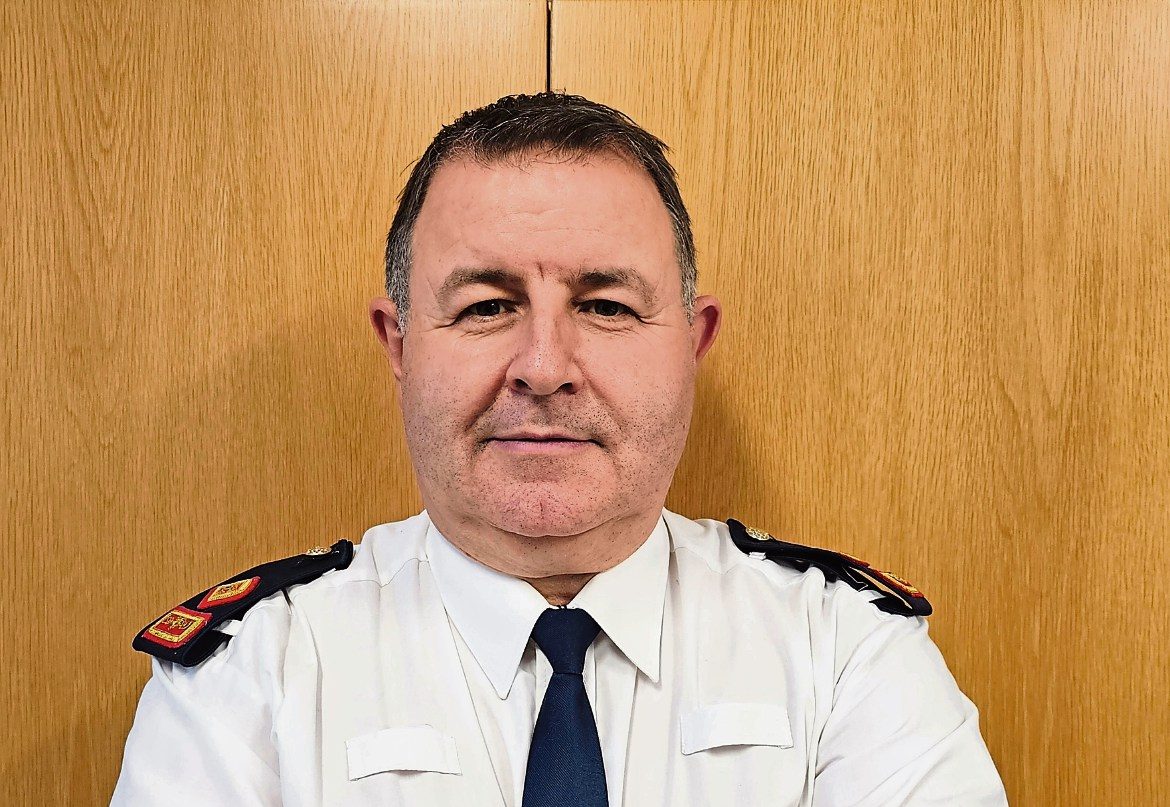AN Garda Síochána’s first ever rural crime lead has vowed to use his role to keep the spotlight on rural crime and emerging crime trends in Donegal.
Superintendent Michael Corbett was appointed to the part-time role in recent weeks. The development has been widely welcomed by Irish Farmers’ Association (IFA) Deputy President Alice Doyle.
The Ballyhea native brings a wealth of policing experience to the role, as he has been working for An Garda Síochána for more than 30 years. While based in Cork, Supt Corbett is no stranger to Donegal, as his wife comes from Letterkenny.
The creation of the first-of-its kind role comes amid increased challenges facing rural communities locally and across the country. Working as part of the Joint Agency Task Force (JATF), gardaí in October conducted a number of operations along the border, with a focus on rural crime and human trafficking. The high-visibility operation targeting rural crime took place on both sides of the border from Donegal to Louth, and involved the close co-operation between An Garda Síochána and the Police Service of Northern Ireland (PSNI). A large number of Garda units, including the Armed Support Unit and Air Support Unit, were involved in patrols and checkpoints throughout the day. Assistance was also provided by Customs Officers from Revenue.
Elsewhere, Coastal Watch Donegal, a multi-agency initiative involving An Garda Síochána, the Irish Naval Service and Revenue’s Customs Service, was relaunched last month at the Coast Guard Station in Killybegs. It’s aimed at preventing and detecting the importation of illegal drugs by promoting the importance of vigilance among those living in coastal communities, as well as those working with the wide range of organisations and agencies at sea and operating along the Donegal coastline.
Speaking to the Donegal News, Supt Corbett said as rural crime lead, he will work to enhance the already good cooperation and collaboration between An Garda Síochána and various different organisations such as councils, local authorities, farming organisations and community groups.
“I’ll be keeping a spotlight on rural crime. I’ll be keeping it in the limelight to see what trends are emerging. I’ll be liaising with my counterparts in the North, UK and Scotland to see what the trends are there in relation to rural crime, and how they’re counteracting it.
“It is a new role that has been created. Most of the UK police forces have a rural crime lead, including the PSNI.”
Asked what the main issues in Donegal are, Supt Corbett said the county’s proximity to the border can be challenging.
“I’m very aware of the lay of the land in Donegal. Donegal has its own challenges because it is so close to the border. There’s challenges with farm machinery being stolen and going across the border, and, likewise, stolen machinery coming from the north into the south.
“The whole area of drugs is a challenge. Rural communities are not immune to the drug crime we have across the country. Donegal is the same as lots of counties across the country. It’s a big geographical area too.
“A large part of my work is around crime prevention and awareness. I’ll be linking in with crime prevention officers around the country on how we can best engage with and protect rural and farming communities in terms of protecting their machinery, security, better lighting, and CCTV.
“Another area that can be challenging is drug intimidation. If anyone out there has a drug debt worked up and can’t pay it, in some instances the people looking for the drug debt to be paid will come to family members. The message I want to get out is that we have inspectors across every division trained in drug intimidation. We would ask people if they are the victim of drug intimidation to come forward and report it to us in confidence at their local garda station or the Garda Confidential Line on 1800 666111.”
Asked why people may not be confident contacting gardaí in relation to drug intimidation, Supt Corbett said fear is a huge factor.
“If you’ve a son or daughter that has a drug debt worked up, families have a fear about them coming to their door, of damage to their property and the embarrassment of it all. There’s a combination of factors that feeds into it.”
But Supt Corbett believes the public, generally, has confidence in gardaí to investigate crime. He said this can be seen in the number of cases that come before local district courts.
“The district court of Letterkenny is no different to that of Cork. They are full every week in every area. They are busy with prosecutions being taken by An Garda Síochána. Before Covid, there were reporters in courts. That had fallen by the wayside for a while, but we’re glad to see reporters are going back into the courts to report on cases. People want to see that in their local newspaper. It gives a sense that An Garda Síochána is out there and that people are being prosecuted if they are involved in criminality, whether it be drink driving, shoplifting, theft of machinery or public order.”
Supt Corbett said he wants to “get the message out there” that An Garda Síochána want people to report anything suspicious, no matter how insignificant it may seem to them.
“Rural communities are spread across big geographical areas. Local communities are our eyes and ears on the ground. Everyone knows their neighbours. We saw during Covid how well the community responded to vulnerable and older people. Everyone looked after each other.
“Rural communities, in general, are very good, and have great camaraderie. We urge anyone who sees, for example, an unusual or suspicious vehicle to ring it in to gardai. We’ll check it out, and if it’s someone up to no-good, it gives us a heads-up.
“But if it’s not reported, it can’t be investigated.”










